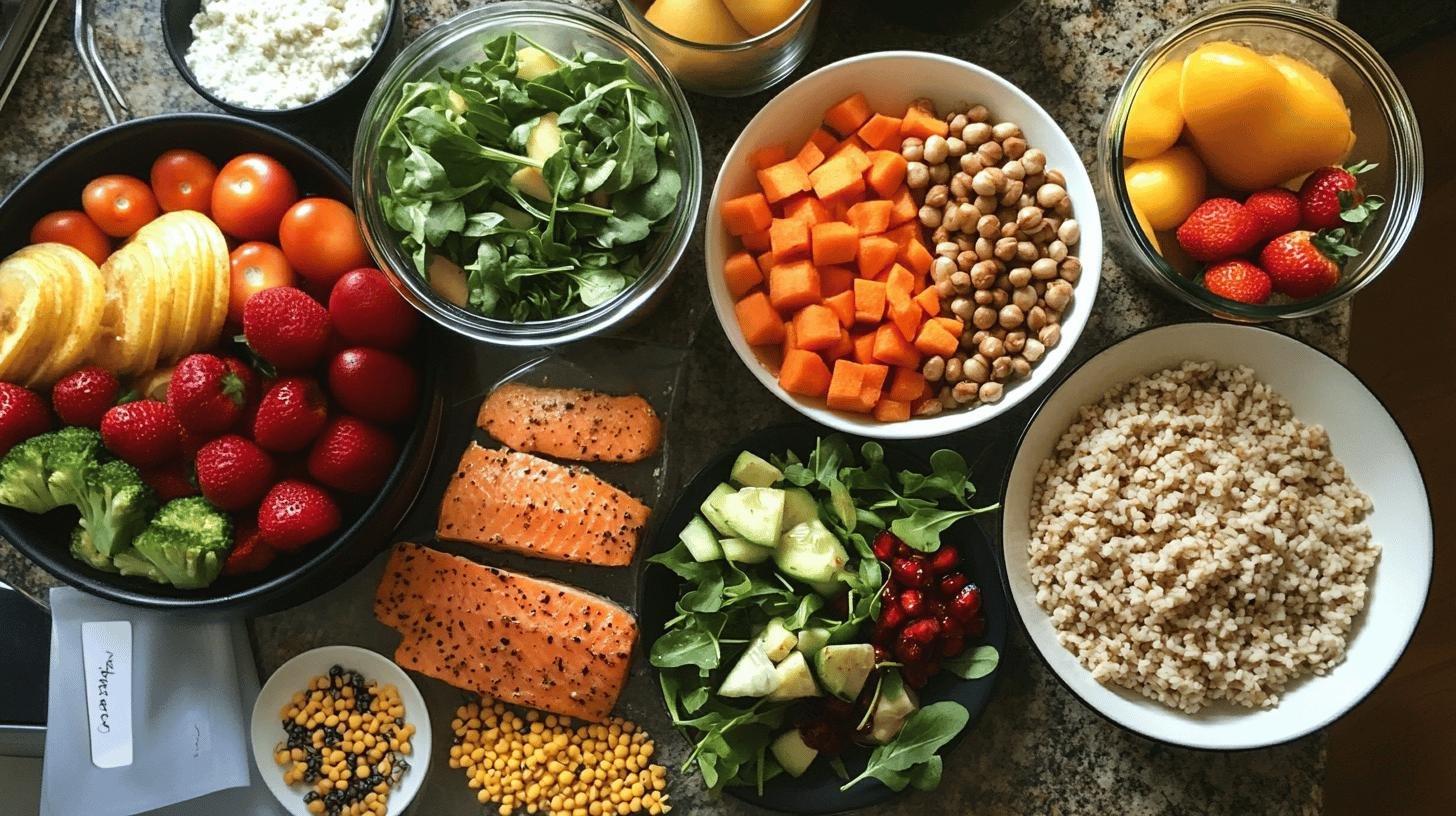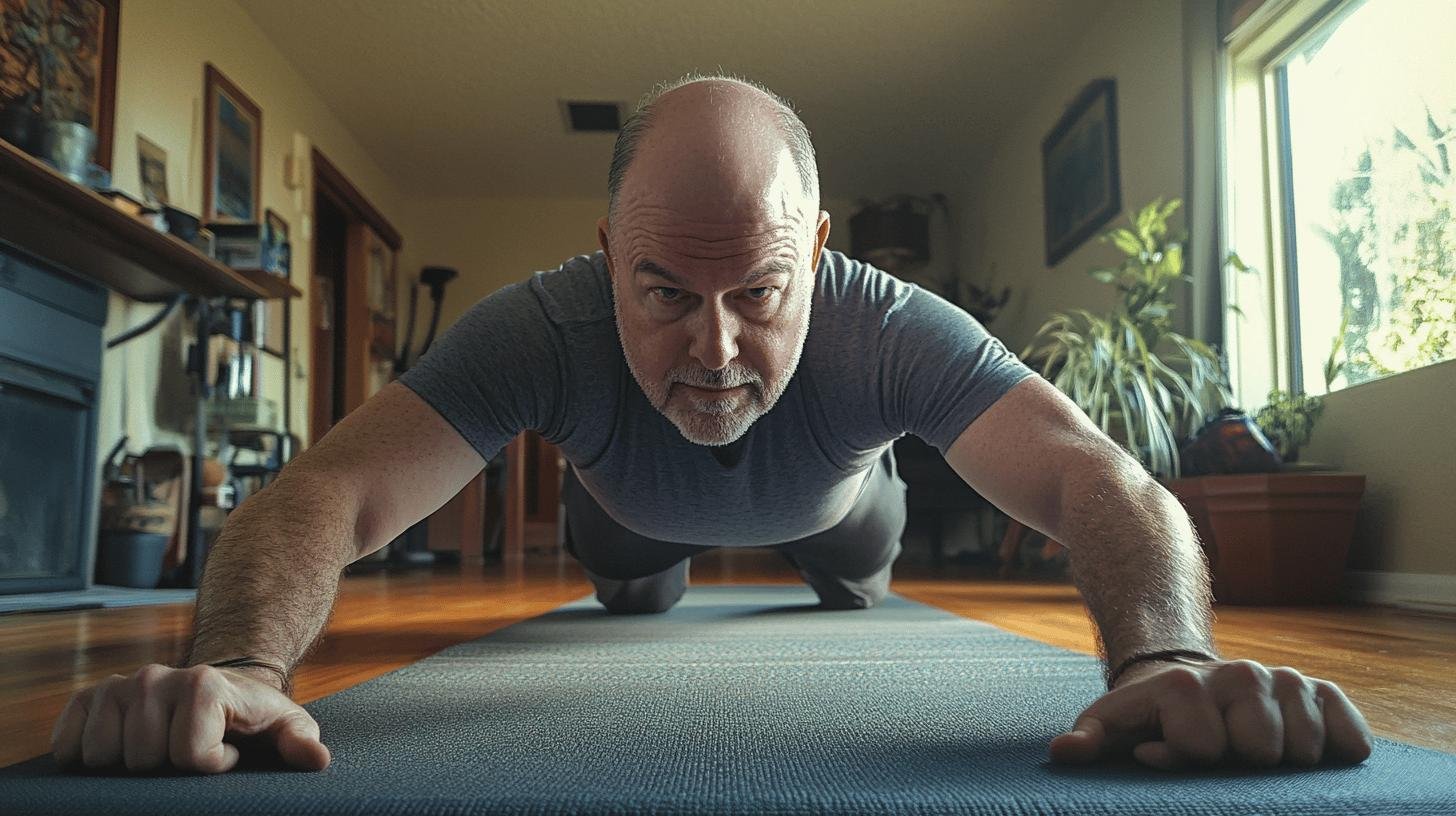TL;DR:
- Realistic Goals: Focus on gradual progress, not quick fixes.
- Nutrient-Dense Foods: Prioritize whole foods for essential nutrients.
- Physical Activity: Incorporate regular exercise; aim for variety (walking, cycling, yoga).
- Portion Control: Use smaller plates and practice mindful eating to avoid overeating.
- Hydration: Drink plenty of water to support metabolism and control appetite.
- Manage Stress: Use techniques like meditation, journaling, and exercise to prevent emotional eating.
- Track Progress: Set specific, measurable, achievable, realistic, and time-bound (SMART) goals.
- Balanced Diet: Combine healthy fats, proteins, and whole grains in meals.
- Fiber: Include high-fiber foods for satiety without added calories.
Ever feel like managing your weight is like juggling flaming swords? I get it. But let’s flip the script—what if I told you it doesn’t have to be that hard? Snagging some simple weight management tips can help you achieve those sustainable weight goals without losing your mind. The key? Gradual lifestyle adjustments and realistic goals that stick with you like a favorite pair of jeans. So, grab your coffee and dive in because we’re chatting about practical ways to make lasting changes in your health journey!
Practical Weight Management Tips for Long-Term Success
Setting sustainable weight goals is key to managing your weight for the long term. Rather than drastic changes, gradual lifestyle adjustments make the journey less daunting and more achievable. Think of weight loss not as a quick fix but as a lasting change. Small, manageable goals set you up for success and keep motivation high.
Here are five core principles for long-term weight management:
- Set Realistic Goals: Aim for gradual, steady progress rather than quick results.
- Prioritize Nutrient-Dense Foods: Focus on whole foods that provide essential nutrients.
- Incorporate Regular Physical Activity: Make exercise a consistent part of your routine.
- Monitor Portion Sizes: Keep an eye on serving sizes to avoid overeating.
- Stay Hydrated: Drink plenty of water to support metabolism and control appetite.
Consistency is crucial in weight management. While temporary diets might yield fast results, they are hard to maintain and often lead to yo-yo dieting. By centring on lifestyle changes, you build habits that support long-term health. It’s about laying a foundation that helps you live your best life daily. So, let’s shift from quick fixes to embracing a healthier journey, one step at a time!
Healthy Lifestyle Changes for Weight Control

Balanced diet plans are your allies in weight control. A balanced diet isn’t only about cutting calories; it’s about fueling your body with the right amounts of fats, carbs, and proteins. These macronutrients work together to stabilise your energy levels and cravings. It’s like tuning your body to perform at its best!
| Food Group | Recommended Intake |
|————–|———————————————-|
| Vegetables | Half your plate at each meal |
| Proteins | A quarter of your plate, focusing on variety |
| Whole Grains | A quarter of your plate |
Nutrient-dense foods are stars in the food world! Colorful fruits and veggies are not only Instagram-worthy but also rich in vitamins and minerals. They boost your immune system, improve digestion, and keep your skin glowing. Plus, they satisfy hunger without extra calories, which is great for weight management.
Gradual lifestyle adjustments are the secret to making changes stick. Start with small swaps, like choosing fruits over sugary snacks or adding extra veggies to meals. Over time, these become second nature. Remember, it’s about progress, not perfection. So make a plan, stick with it, and watch healthy habits become part of your daily life. Keep it simple, sustainable, and fun!
Dietary Adjustments: Managing Calorie Intake and Portion Control
Calorie control is key in managing weight. When you manage calories, you prevent extra pounds from creeping up. If you consume more calories than you burn, the excess is stored as fat. By focusing on calorie intake, you encourage your body to use stored energy, or fat. This isn’t about starvation—it’s about smart choices that align with health goals.
- Use smaller plates to limit portion sizes naturally.
- Serve meals in the kitchen to avoid second helpings.
- Practice mindful eating by savoring each bite.
- Measure snacks and meals to avoid guesswork.
These techniques are your secret weapons for healthy eating habits. By being mindful of portions, you improve your relationship with food. It helps recognize true hunger and fullness, preventing overeating. Plus, it encourages nutritious choices over empty-calorie foods, supporting wellness, one bite at a time.
Incorporating Daily Physical Activity and Exercise Routines

Daily physical activity is essential for both physical and mental health. It balances energy intake with energy use, helping manage weight. Exercise releases feel-good chemicals like endorphins, boosting mood and reducing stress. It’s a natural pick-me-up that keeps you focused on health goals.
- Walking: An easy way to get moving.
- Cycling: Great for cardio and outdoor fun.
- Yoga: Enhances flexibility and mental clarity.
- Swimming: Full-body workout, gentle on joints.
- Dancing: Energetic and fun, burns calories.
Strength training deserves special mention. It builds muscle and boosts metabolism. Increased muscle mass burns calories even at rest. Strength training can be as simple as weights, resistance bands, or body-weight exercises. It builds strength and endurance, leading to better fitness and resilience.
Making these activities a daily routine makes weight management part of life, not a chore. Variety keeps it interesting and covers all fitness aspects, from cardio to strength. When exercise becomes a habit, it leads to a healthier, more active you. So, lace up and get moving!
Mindful Eating and Stress Management Techniques
Mindful eating means tuning into your body’s signals and understanding your relationship with food. Are you reaching for a snack out of boredom or stress, not hunger? Mindful eating makes you aware of why and what you’re eating, reducing overeating. It enhances your eating experience and promotes healthier choices. Next time you eat, savour the flavours and textures for satisfying meals and less mindless munching.
- Meditation: Spend a few minutes focusing on your breath to clear your mind.
- Journaling: Write to process emotions instead of eating them away.
- Deep Breathing: Calm nerves and reduce stress-induced cravings.
- Exercise: Regular physical activity manages stress and improves mood.
These techniques are your toolkit for controlling emotional eating. Stress releases hormones that trigger cravings. Managing stress keeps you from reaching for comfort foods. These methods offer healthy ways to cope, reducing stress-related eating. They support weight management by keeping your mind and body balanced.
Tracking Progress and Setting Realistic Goals
![]()
Tracking your progress is like having a cheerleader on your weight management journey. Weekly checks on weight and measurements boost motivation and help see the big picture. If the scale doesn’t move, noticing inches lost or better-fitting clothes uplifts you. It helps catch patterns and make adjustments, ensuring you’re on track to meet goals. Tangible proof of effort boosts confidence.
- Specific: Define clear goals like “lose 10 pounds.”
- Measurable: Use numbers to monitor progress, e.g., “walk 10,000 steps daily.”
- Achievable: Set challenging yet possible goals, like “exercise three times weekly.”
- Realistic: Ensure goals fit your lifestyle, considering time and resources.
- Time-bound: Give yourself deadlines, like “lose 5 pounds in a month.”
Setting realistic expectations avoids the yo-yo effect of weight gain and loss. Ambitious goals risk burnout or defeat if unmet. Aligning goals with capabilities ensures healthy, sustainable progress. It aids in losing and keeping off weight, making it a lifestyle change, not a temporary fix.
The Role of Hydration and Nutritional Advice in Weight Loss
Drinking more water is a staple in weight loss tips. Staying hydrated boosts your metabolism. Water helps burn calories efficiently and process nutrients, aiding digestion and appetite control. When a snack craving hits, try sipping water first—it could be thirst, not hunger.
Fiber acts as nature’s filler, helping you feel full without extra calories. High-fiber foods like fruits, veggies, and whole grains are filling and smooth digestive run, reducing bloating. Focus on balanced nutrients, like proteins, healthy fats, and complex carbs. Prioritizing these nutritional powerhouses supports weight management and a healthier lifestyle overall.
Final Words
Tackling weight management doesn’t have to be a wild ride. We chatted about solid strategies like setting sustainable goals and making gradual lifestyle tweaks. These changes, paired with a balanced diet and mindful eating, make a big difference!
Getting physical regularly and managing stress are real game-changers, too! Adding these to the mix helps set you up for long-term success. Remember, the key is consistency over quick fixes.
With these weight management tips, you’re on the path to a healthier lifestyle. Keep it steady and stay positive!
FAQ
Q: What are some weight management tips for beginners?
A: Successful weight management for beginners involves setting realistic goals, making gradual lifestyle adjustments, monitoring calorie intake, practicing portion control, and incorporating regular physical activities. Consistency is key for sustainable results.
Q: What are weight management tips specifically for women?
A: Women can benefit from balanced diets, consistent exercise, strength training, mindful eating, and stress management techniques to effectively manage their weight. Personalizing plans to fit individual health needs is also crucial.
Q: How can I lose weight in 7 days?
A: While safe, effective weight loss generally takes time, you can kickstart it with healthier eating habits, more water, portion control, and by increasing daily physical activities. Remember, long-term strategies are most effective.
Q: What are extreme weight loss methods?
A: Extreme methods, like severe calorie restriction or excessive exercising, can be harmful. Focus on balanced, sustainable lifestyle changes instead; they lead to healthier long-term results and minimize health risks.
Q: How can I lose weight fast, naturally, and permanently?
A: Permanent weight loss involves combining a balanced diet with regular exercise, staying hydrated, managing stress, and being consistent. Natural approaches focus on gradual lifestyle changes for lasting outcomes.
Q: What are some weight loss tips to follow at home?
A: Cook more meals using fresh ingredients, monitor portions, engage in home workouts, stay hydrated, and keep a food journal. Small adjustments at home can lead to significant weight loss over time.
Q: What is healthy weight loss per week in kg?
A: A healthy weight loss rate is about 0.5 to 1 kg per week. This pace is sustainable and minimizes health risks while encouraging lasting lifestyle changes.
Q: What are 5 ways to manage weight effectively?
A: Effective weight management can be achieved through:
- Consistent exercise
- Balanced diet
- Portion control
- Stress management
- Regular progress tracking
Q: What are 5 tips for weight loss?
A: Here’s a list to get you started:
- Practice portion control
- Drink plenty of water
- Stay active daily
- Eat more fiber
- Avoid processed foods
Q: What is the 30 30 30 rule for weight loss?
A: The 30 30 30 rule emphasizes 30 minutes of exercise, 30 grams of protein, and 30 grams of fiber daily to support weight loss and promote overall health.
Q: What is the most effective way of managing weight?
A: The most effective weight management strategy combines consistent physical activity, balanced diet, mindful eating, stress management, and realistic goal setting. Remember, a steady pace wins the race in maintaining a healthy weight.

